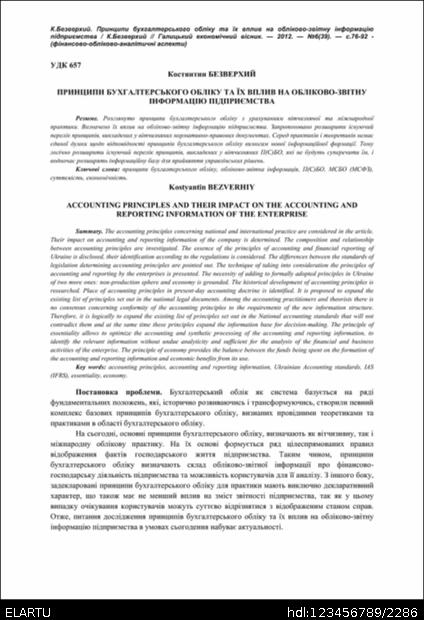Ezzel az azonosítóval hivatkozhat erre a dokumentumra forrásmegjelölésben vagy hiperhivatkozás esetén:
http://elartu.tntu.edu.ua/handle/123456789/2286

Összes dokumentumadat
| DC mező | Érték | Nyelv |
|---|---|---|
| dc.contributor.author | Безверхий, Костянтин | - |
| dc.contributor.author | Bezverhiy, Kostyantin | - |
| dc.date.accessioned | 2013-05-28T10:46:25Z | - |
| dc.date.available | 2013-05-28T10:46:25Z | - |
| dc.date.issued | 2012 | - |
| dc.identifier.citation | К.Безверхий. Принципи бухгалтерського обліку та їх вплив на обліково-звітну інформацію підприємства / К.Безверхий // Галицький економічний вісник. — 2012. — №6(39). — с.76-92 - (фінансово-обліково-аналітичні аспекти) | uk |
| dc.identifier.uri | http://elartu.tntu.edu.ua/handle/123456789/2286 | - |
| dc.description.abstract | Розглянуто принципи бухгалтерського обліку з урахуванням вітчизняної та міжнародної практики. Визначено їх вплив на обліково-звітну інформацію підприємства. Запропоновано розширити існуючий перелік принципів, викладених у вітчизняних нормативно-правових документах. Серед практиків і теоретиків немає єдиної думки щодо відповідності принципів бухгалтерського обліку вимогам нової інформаційної формації. Тому логічно розширити існуючий перелік принципів, викладених у вітчизняних П(С)БО, які не будуть суперечити їм, і водночас розширять інформаційну базу для прийняття управлінських рішень. | uk |
| dc.description.abstract | The accounting principles concerning national and international practice are considered in the article. Their impact on accounting and reporting information of the company is determined. The composition and relationship between accounting principles are investigated. The essence of the principles of accounting and financial reporting of Ukraine is disclosed, their identification according to the regulations is considered. The differences between the standards of legislation determining accounting principles are pointed out. The technique of taking into consideration the principles of accounting and reporting by the enterprises is presented. The necessity of adding to formally adopted principles in Ukraine of two more ones: non-production sphere and economy is grounded. The historical development of accounting principles is researched. Place of accounting principles in present-day accounting doctrine is identified. It is proposed to expand the existing list of principles set out in the national legal documents. Among the accounting practitioners and theorists there is no consensus concerning conformity of the accounting principles to the requirements of the new information structure. Therefore, it is logically to expand the existing list of principles set out in the National accounting standards that will not contradict them and at the same time these principles expand the information base for decision-making. The principle of essentiality allows to optimize the accounting and synthetic processing of the accounting and reporting information, to identify the relevant information without undue analyticity and sufficient for the analysis of the financial and business activities of the enterprise. The principle of economy provides the balance between the funds being spent on the formation of the accounting and reporting information and economic benefits from its use. | uk |
| dc.language.iso | uk | uk |
| dc.publisher | Тернопільський національний технічний університет ім. Івана Пулюя | uk |
| dc.subject | принципи бухгалтерського обліку | uk |
| dc.subject | обліково-звітна інформація | uk |
| dc.subject | П(С)БО | uk |
| dc.subject | МСБО (МСФЗ) | uk |
| dc.subject | суттєвість | uk |
| dc.subject | економічність | uk |
| dc.subject | accounting principles | uk |
| dc.subject | accounting and reporting information | uk |
| dc.subject | Ukrainian Accounting standards | uk |
| dc.subject | IAS (IFRS) | uk |
| dc.subject | essentiality | uk |
| dc.subject | economy | uk |
| dc.title | Принципи бухгалтерського обліку та їх вплив на обліково-звітну інформацію підприємства | uk |
| dc.title.alternative | Accounting principles and their impact on the accounting and reporting information of the enterprise | uk |
| dc.type | Article | uk |
| dc.rights.holder | © „Галицький економічний вісник“ | uk |
| dc.coverage.placename | Тернопіль, Україна | uk |
| dc.status | Опубліковано раніше | uk |
| dc.subject.udc | 657 | uk |
| Ebben a gyűjteményben: | Галицький економічний вісник, 2012, № 6 (39) | |
Fájlok a dokumentumban:
Minden dokumentum, ami a DSpace rendszerben szerepel, szerzői jogokkal védett. Minden jog fenntartva!